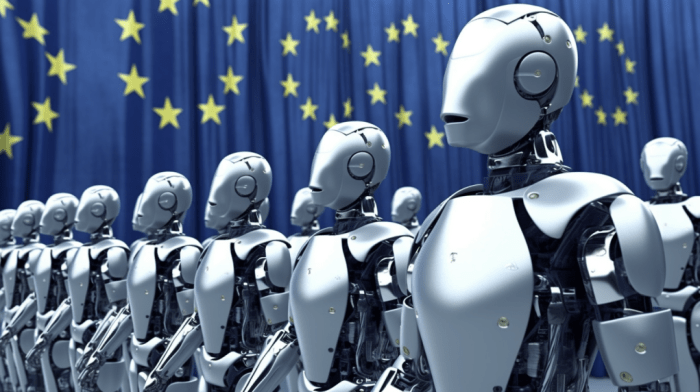European ai supporting tech sector recovery – European AI: Supporting Tech Sector Recovery is more than just a catchy phrase; it’s a blueprint for revitalizing Europe’s tech landscape. The continent’s tech sector faces significant challenges, from a lack of investment to a talent shortage. However, AI offers a potent solution, driving innovation and fostering economic growth.
By harnessing the power of AI, European businesses can overcome these obstacles and achieve greater resilience. From optimizing manufacturing processes to revolutionizing healthcare, AI applications are already making a tangible impact. This shift towards AI-driven solutions is not only boosting efficiency but also creating new opportunities for businesses and individuals alike.
The Role of AI in European Tech Sector Recovery
The European tech sector is facing a challenging landscape. While it boasts a vibrant startup scene and a strong talent pool, it lags behind its US and Asian counterparts in terms of overall market capitalization and global influence. Several factors contribute to this situation, including limited access to venture capital, fragmented regulatory environments, and a lack of large-scale tech giants.
However, amidst these challenges, artificial intelligence (AI) presents a unique opportunity to fuel innovation and propel the European tech sector towards recovery.
AI as a Catalyst for Innovation
AI can be a powerful catalyst for innovation across various sectors, including healthcare, manufacturing, finance, and transportation. By leveraging AI technologies, European companies can develop new products and services, optimize existing processes, and gain a competitive edge in the global market.
Specific Applications and Benefits
- Personalized Healthcare:AI-powered diagnostics and treatment plans can improve patient outcomes and reduce healthcare costs. For example, the Danish company, Coloplast, uses AI to analyze patient data and predict potential complications, enabling proactive intervention and improved care.
- Smart Manufacturing:AI-driven automation and predictive maintenance can optimize production processes, reduce downtime, and enhance efficiency. Siemens, a German multinational conglomerate, utilizes AI in its factories to monitor equipment performance, predict maintenance needs, and optimize production schedules.
- Financial Services:AI can automate tasks, detect fraud, and personalize financial products. Fintech companieslike TransferWise, based in London, leverage AI to optimize currency exchange rates and offer personalized financial services to their customers.
- Sustainable Transportation:AI can be used to develop smart traffic management systems, optimize logistics, and promote sustainable transportation solutions. The French company, NAVYA, specializes in autonomous vehicles and is working with cities across Europe to develop smart mobility solutions.
Successful AI Implementations in European Companies
Several European companies have successfully implemented AI solutions to drive growth and resilience.
Examples of AI-Driven Success
- DeepMind, a British AI company acquired by Google, developed an AI system that can predict protein structures with unprecedented accuracy, revolutionizing drug discovery and disease research.
- Spotify, a Swedish music streaming service, uses AI to personalize music recommendations, improve user engagement, and discover new artists.
- Zalando, a German online fashion retailer, utilizes AI to personalize product recommendations, optimize inventory management, and improve customer experience.
European AI Initiatives and Policies: European Ai Supporting Tech Sector Recovery

The European Union (EU) recognizes the transformative potential of Artificial Intelligence (AI) and its crucial role in driving economic growth and addressing societal challenges. To foster the responsible development and adoption of AI, the EU has implemented a comprehensive set of initiatives and policies.
These aim to create a favorable environment for AI innovation while addressing ethical concerns and ensuring responsible use.
The European AI Strategy
The European AI Strategy, launched in 2018, Artikels the EU’s vision for AI development and deployment. It emphasizes the importance of ethical and trustworthy AI, focusing on key principles such as human oversight, transparency, and accountability. The strategy also identifies strategic areas for AI development, including healthcare, manufacturing, and transportation.
- Investing in AI Research and Innovation:The EU has allocated significant funding for AI research and development through initiatives such as the Horizon Europe program. This funding supports projects aimed at advancing AI capabilities, developing new applications, and fostering collaboration among researchers and businesses.
- Promoting AI Adoption in Industry:The EU encourages the uptake of AI technologies across various sectors through programs and initiatives that provide financial support, technical assistance, and access to expertise. The aim is to help businesses adopt AI solutions to enhance productivity, improve efficiency, and create new products and services.
- Building a Data Economy:Access to high-quality data is essential for AI development. The EU is promoting the development of a data economy by establishing frameworks for data sharing and access, ensuring data privacy and security, and promoting the use of open data.
- Addressing Ethical and Societal Concerns:The EU recognizes the potential risks associated with AI, including bias, discrimination, and job displacement. The strategy emphasizes the need for ethical guidelines and regulations to ensure that AI is developed and deployed responsibly. The EU has established a High-Level Expert Group on Artificial Intelligence to provide guidance on ethical considerations and best practices.
The AI Act
The EU’s AI Act, proposed in 2021, is a landmark regulation aimed at establishing a comprehensive framework for the development, deployment, and use of AI systems within the EU. The Act categorizes AI systems based on their risk level and proposes different regulatory requirements for each category.
- Risk-Based Approach:The AI Act adopts a risk-based approach, focusing on regulating AI systems that pose higher risks to individuals or society. High-risk AI systems, such as those used in critical infrastructure or law enforcement, will be subject to stricter requirements, including conformity assessments, human oversight, and transparency.
- Prohibition of Certain AI Systems:The AI Act proposes a ban on certain AI systems deemed unacceptable, such as those that manipulate human behavior in a way that causes harm, or those that use subliminal techniques to influence people’s behavior without their knowledge.
- Transparency and Explainability:The Act emphasizes the importance of transparency and explainability for AI systems. Users should be informed about the functioning of AI systems and the potential impact of their decisions. This includes providing clear explanations for AI-generated outputs and enabling users to understand the rationale behind AI decisions.
- Human Oversight and Control:The AI Act stresses the importance of human oversight and control over AI systems. It requires developers and users of AI systems to ensure that human operators are involved in decision-making processes and can intervene when necessary. This is particularly important for high-risk AI systems, where human judgment and oversight are crucial to prevent unintended consequences.
Examples of European AI Policies in Action, European ai supporting tech sector recovery
- The European Health Data Space (EHDS):The EHDS aims to facilitate the secure and responsible sharing of health data across the EU. This initiative is expected to accelerate the development and deployment of AI-powered healthcare solutions by providing access to large datasets for training and validation.
- The European Green Deal:The Green Deal aims to achieve climate neutrality by 2050. AI technologies are expected to play a crucial role in achieving this goal by optimizing energy consumption, developing sustainable solutions, and monitoring environmental impact. The EU is investing in AI research and development to support the Green Deal’s objectives.
In this topic, you find that french startup 40mn co2 battery recycling tech is very useful.
AI Investments and Funding Opportunities

The European AI landscape is experiencing a surge in investment, driven by the recognition of its potential to drive economic growth and address societal challenges. Funding for AI research and development comes from a variety of sources, including government initiatives, venture capital firms, and corporate investments.
This section explores the key funding sources, investment trends, and challenges and opportunities for European startups and companies seeking to secure funding for AI projects.
Major Funding Sources for AI
Government programs play a pivotal role in fostering AI innovation in Europe. The European Union has launched several initiatives to support AI research, development, and deployment. The Horizon Europe program, for instance, allocates significant funds for AI projects, focusing on areas like healthcare, manufacturing, and sustainability.
National governments, such as France and Germany, also have dedicated funding programs to support AI startups and companies. Venture capital firms are increasingly investing in European AI startups, recognizing their potential for high returns. These firms provide seed funding, Series A and B rounds, and growth capital to support the development and expansion of promising AI companies.
Some notable European venture capital firms specializing in AI include Index Ventures, Atomico, and Accel.Corporate investments are another important source of funding for AI. Large companies, particularly those in sectors like technology, finance, and healthcare, are actively investing in AI startups and companies to acquire new technologies, enhance their products and services, and gain a competitive edge.
Examples include Google’s investment in DeepMind, a leading AI research company, and Microsoft’s acquisition of LinkedIn, a professional networking platform that leverages AI for talent matching and recruitment.
The Impact of AI on Different Tech Sectors
AI is rapidly transforming various sectors across Europe, driving innovation and efficiency. Its influence is particularly prominent in healthcare, manufacturing, finance, and transportation. Let’s delve into how AI is shaping these industries.
Healthcare
AI is revolutionizing healthcare in Europe by improving diagnosis, treatment, and patient care.
- AI-powered diagnostics:AI algorithms analyze medical images, such as X-rays and MRIs, to detect abnormalities and assist doctors in making accurate diagnoses. This allows for earlier detection of diseases and potentially improves treatment outcomes.
- Personalized medicine:AI can analyze patient data, including medical history, genetic information, and lifestyle factors, to create personalized treatment plans. This approach can optimize therapy based on individual needs and potentially reduce adverse effects.
- Drug discovery and development:AI is accelerating the process of drug discovery by analyzing vast amounts of data to identify potential drug candidates and predict their efficacy. This can lead to faster development of new treatments for various diseases.
However, ethical considerations regarding data privacy, algorithmic bias, and the potential displacement of healthcare professionals need careful attention.
Manufacturing
AI is transforming manufacturing processes in Europe, leading to increased efficiency, productivity, and flexibility.
- Predictive maintenance:AI algorithms analyze sensor data from machines to predict potential failures and schedule maintenance proactively. This reduces downtime, minimizes unexpected breakdowns, and optimizes production efficiency.
- Quality control:AI-powered vision systems inspect products for defects in real-time, ensuring consistent quality and reducing human error. This allows for faster and more accurate quality control processes.
- Robotic automation:AI-powered robots perform repetitive tasks, freeing up human workers for more complex and value-adding activities. This increases productivity and reduces labor costs in manufacturing.
The adoption of AI in manufacturing requires investment in infrastructure, upskilling of the workforce, and addressing potential job displacement concerns.
Finance
AI is transforming the financial sector in Europe by automating tasks, improving risk management, and enhancing customer experience.
- Fraud detection:AI algorithms analyze transaction data to identify fraudulent activities in real-time, preventing financial losses and protecting customers.
- Credit risk assessment:AI models analyze customer data to assess creditworthiness and make lending decisions more efficiently. This can help banks extend credit to more individuals and businesses while mitigating risk.
- Personalized financial advice:AI-powered chatbots and robo-advisors provide personalized financial advice based on individual needs and goals. This can make financial services more accessible and affordable.
The use of AI in finance raises concerns about data security, algorithmic bias, and the potential for job displacement.
Transportation
AI is transforming transportation in Europe, making it more efficient, safer, and sustainable.
- Autonomous vehicles:AI-powered self-driving cars and trucks have the potential to revolutionize transportation by reducing accidents, traffic congestion, and fuel consumption. This can improve road safety and reduce environmental impact.
- Traffic management:AI algorithms analyze traffic data to optimize traffic flow, reduce congestion, and improve public transportation efficiency. This can make transportation more reliable and reduce travel time.
- Logistics optimization:AI can optimize logistics operations by improving route planning, scheduling, and delivery efficiency. This can reduce transportation costs and improve delivery times.
The development and deployment of autonomous vehicles raise ethical considerations regarding safety, liability, and job displacement.
The Future of AI in European Tech Recovery
The European tech sector is poised for a significant resurgence, driven by the transformative power of artificial intelligence (AI). AI’s ability to automate processes, enhance decision-making, and unlock new opportunities presents a unique chance for Europe to regain its competitive edge in the global technology landscape.
This section explores the long-term implications of AI for the European tech sector, highlighting potential growth areas, emerging trends, and key factors shaping the future of AI in Europe.
Potential Growth Areas and Emerging Trends
AI is set to revolutionize various sectors within the European tech landscape, creating new opportunities and driving growth. Some of the most promising areas include:
- AI-powered healthcare:AI is transforming healthcare by enabling faster and more accurate diagnoses, personalized treatment plans, and drug discovery. Europe is home to world-class research institutions and a strong healthcare infrastructure, making it well-positioned to lead in AI-driven healthcare solutions.
- AI-driven manufacturing:AI is streamlining manufacturing processes through automation, predictive maintenance, and quality control. Europe’s focus on sustainability and advanced manufacturing techniques positions it to leverage AI for optimizing production and reducing environmental impact.
- AI-enabled financial services:AI is revolutionizing financial services through fraud detection, risk assessment, and personalized financial advice. Europe’s strong financial sector and commitment to data privacy create a fertile ground for AI-driven innovations in this area.
- AI for climate change mitigation:AI can play a crucial role in addressing climate change by optimizing energy consumption, developing sustainable solutions, and predicting climate patterns. Europe’s ambitious climate goals provide a powerful incentive for AI-driven solutions in this domain.
Key Factors Shaping the Future of AI in Europe
The future of AI in Europe will be shaped by a complex interplay of factors, including:
- Regulatory frameworks:Europe is at the forefront of AI regulation, with the EU’s AI Act setting the stage for ethical and responsible AI development. These regulations will be crucial in fostering trust and ensuring the responsible deployment of AI technologies.
- Talent development:Europe needs to invest heavily in AI education and training to develop a skilled workforce capable of driving AI innovation. Initiatives to promote STEM education and upskilling programs will be essential for building a strong AI talent pool.
- Technological advancements:The rapid evolution of AI technologies, such as natural language processing, computer vision, and robotics, will continue to drive innovation and open up new possibilities for the European tech sector. Investing in research and development will be crucial for staying ahead of the curve.
- Data infrastructure:Access to high-quality data is essential for training and deploying AI models. Europe needs to invest in data infrastructure, including data sharing initiatives and secure data storage solutions, to support AI development and deployment.
AI’s Contribution to European Tech Sector Recovery
The following table illustrates how AI can contribute to the European tech sector recovery across different sectors:





